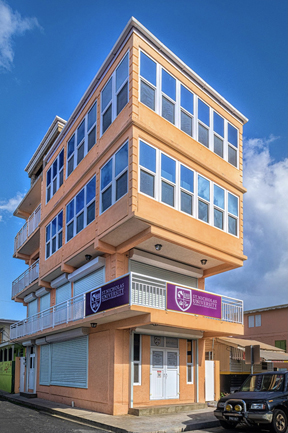St. Nicholas University in Dominica aims to attract international students
St. Nicholas University

VIN News Service screenshot
St. Nicholas University School of Veterinary Medicine opened in January to a handful of students in the Commonwealth of Dominica, a Caribbean island nation.
A new veterinary school in the Caribbean is slated to welcome its first cohort of international students, some from the United States, for orientation on Oct. 1, provided the region isn't shut down due to the pandemic.
Officials with St. Nicholas University School of Veterinary Medicine haven't shared how many students plan to travel this fall to the Commonwealth of Dominica. Since the program opened in January, around 14 local students have enrolled, all from areas once classified by the government as low-risk for COVID-19.
The institution, a private nonprofit based in Roseau, the island nation's capital, offers just one area of study: veterinary medicine. The program is associated with St. Nicholas Animal Rescue. Dr. Golnaz Naderkhani, a physician from Canada, is tasked with launching the program.
Naderkhani did not respond to multiple VIN News Service inquiries by phone and email about the veterinary school and its status.
A representative who answered the phone in Naderkhani's office explained that St. Nicholas' current students are studying on the island, but remotely rather than in classrooms, and lamented that COVID-19 has slowed the veterinary school's development. The country of 70,000 residents reported 494 active cases as of Sept. 7; in June, there were none.
The U.S. Centers for Disease Control and Prevention has categorized the risk of contracting COVID-19 in Dominica as "very high," and urges Americans to avoid the island. To curb the spread of the highly contagious delta variant, Dominica — like nearby Jamaica, Martinique, Bahamas, Barbados and St. Lucia — has periodically imposed travel lockdowns.
Accreditation controversy
Meanwhile, questions about accreditation have caused a stir.
Naderkhani drew criticism from residents earlier this year when she asserted that the program is accredited, according to a local news report. "We have even gone a step further," the article quotes Naderkhani saying. "We are listed by the American Veterinary Medical Association, which means our graduates will be able to practice veterinary medicine in Canada or the United States."
It's unclear whether the reference to accreditation refers to U.S. accreditation or accreditation by another entity. St. Nicholas is recognized by the Commonwealth of Dominica and the World Veterinary Association, according to the program's website, but that is not the same as accreditation. The Commonwealth of Dominica's National Accreditation Board identifies three accredited institutions, none of which is St. Nicholas.
In the U.S., accreditation is conferred by the AVMA Council on Education. St. Nicholas has not to date applied for U.S. accreditation, the AVMA told the VIN News Service. However, the program is listed in the AVMA's directory of foreign programs that are recognized by their own governments.
That listing qualifies graduates of St. Nicholas (and the other programs on the list) to take one of two equivalency examinations that assess whether they received education on par with that of U.S.-accredited programs. Those who pass either equivalency exam may take the North American Veterinary Licensing Examination, a test required of all veterinarians wishing to practice in U.S. and Canadian jurisdictions.
By comparison, U.S. students attending an institution that is accredited by the AVMA COE have access to federal student loans and don't need to take an equivalency exam before taking the NAVLE.
Naderkhani's reported statement that St. Nicholas is accredited insults the intelligence of Dominicans, a reader of the local news story asserted.
"Madam, your school is not accredited," wrote a reader using the handle Jane Doe. "It's okay to tell the people that getting the school accredited is part of the future achievements … but don't make a joke out of a population in their own country. Don't start the foundation of your school without trust."
Another reader took issue with the fact that Naderkhani is neither Dominican nor a veterinarian. “Why have a president in post who is not even a qualified or trained vet? Why can't a home-born Dominican have this role?” asked a reader identified as Josephine Baptiste.
Naderkhani has not publicly addressed the comments.
Facts and figures on St. Nicholas
The opening of St. Nicholas brings the number of AVMA-listed veterinary schools in the Caribbean to five: St. Matthew's University School of Veterinary Medicine in Grand Cayman; Ross University College of Veterinary Medicine in St. Kitts; St. George's University School of Veterinary Medicine in Grenada; and The University of the West Indies School of Veterinary Medicine in Trinidad and Tobago. Those programs are well-established and most attract U.S. and Canadian students, graduating hundreds of veterinarians annually. Only the West Indies program does not draw a large proportion of its student body from outside of the Caribbean.
The veterinary programs at Ross and St. George's are U.S.-accredited; St. Matthew's and West Indies are not.
Annual tuition for veterinary schools at Ross, St. George's and St. Matthew's runs between $55,000 and $65,000, not including living and travel expenses. St. Nicholas offers four- and five-year programs at $10,000 per semester, or $30,000 a year, according to the institution's website.
Aspiring St. Nicholas students are expected to have at least 60 undergraduate credits to apply for the four-year program, but veterinary technicians who graduated in the U.S., Canada, Trinidad and Guyana are given "special consideration" if they fall short. Others can bypass the credits requirements, too, based on their professional and academic achievements, the website says.
Applicants to the five-year program must have a high school diploma with official transcripts showing they earned at least a C grade in English, mathematics and chemistry, the website says.
Editor's note: This article was amended post-publication to include the veterinary program at The University of the West Indies.